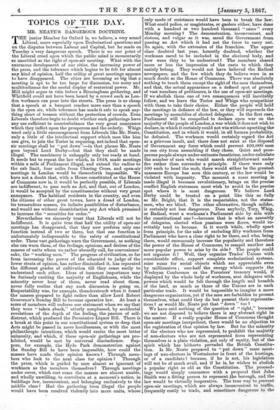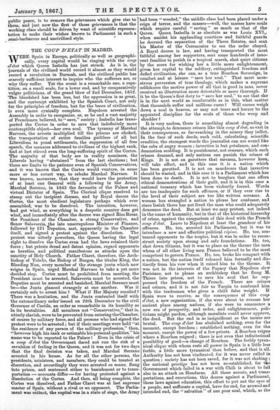TOPICS OF THE DAY.
MR. NEATE'S DANGEROUS DOCTRINE.
T'junior Member for Oxford is, we believe,"a very sound Liberal, more especially upon Ecclesiastical questions and on the disputes between Labour and Capital, but he made on Tuesday a very dangerous speech. There is no one point of the Liberal creed upon which the public mind is momentarily so unsettled as the right of open-air meeting. What with the enormous development of our cities, the increasing power of the press, and the tolerance which begins to be felt for almost any kind of opinion, half the utility of great meetings appears to have disappeared. The cities are becoming so big that a meeting is apt to be too large for discussion, too noisy and multitudinous for the useful display of oratorical power. Mr. Mill might argue in vain before a Birmingham gathering, and Whitfield could not have been heard by a crowd such as Lon- don workmen can pour into the streets. The press is so cheap that a speech at a banquet reaches more ears than a speech in the open air, while tolerance has made it safe to speak any- thing short of treason without the protection of crowds. Even Liberals therefore begin to doubt whether such gatherings have any use sufficient to counterbalance the very great annoyance which they inflict upon the prosperous and the orderly. Whigs need only a little encouragement from Liberals like Mr. Neate, only a little of the intellectual support which men like him can give, to join the Tories in requiring, not indeed that open- air meetings shall be "put down"—in that phrase Mr. Neate goes beyond Lord Derby—but that they shall be made illegal. The machinery is unhappily only too ready at hand. It needs but to repeat the law which, in 1848, made meetings within a mile of Parliament illegal, and extend the radius to the cab limit, four miles from Charing Cross, and open-air meetings in London would be thenceforth impossible. We have not a doubt that, with a House constituted as the House of Commons now is, it would be perfectly possible, if Liberals are indifferent, to pass such an Act, and that, out of London, it would be accepted by the constituencies without very great annoyance. The habitual residents in the country, and even the citizens of other great towns, have a dread of London, its tremendous masses, its infinite possibilities of disturbance, • and would see without dissatisfaction any Act which promised to increase the "securities for order."
Nevertheless we sincerely trust that Liberals will not be indifferent. It is quite true that half the utility of open-air meetings has disappeared, that they now perform only one function instead of two or three, but that one function is unfortunately indispensable to the safety of constitutional order. These vast gatherings warn the Government, as nothing else can warn them, of the feelings, opinions, and desires of the masses of units whom we rather absurdly call, for convenience' sake, the "working men." The progress of civilization, so far from increasing the power of the educated to judge of the lower strata of opinion, has rather diminished it, has separated the different grades of cultivation till they cease easily to understand each other. Ideas of immense importance may be furiously exciting the majority of Englishmen, while the minority never hear of them, never read about them, never fully realize that any such discussion is going on. Respectability was, for example, thunderstruck when it found the masses prepared to fight rather than allow Lord Robert Grosvenor's Sunday Bill to become operative law. At least a score of members will endorse our statement when we say that they were "taken aback," utterly nonplussed, by accidental revelations of the depth of the feeling, the passion of self- distrust, which produced the Permissive Liquor Bill. There is a break at this point in our constitutional system so deep that Acts might be passed in mere heedlessness, or with the most philanthropic intentions, which would excite the most bitter animosity, and which, if these open-air gatherings are pro- hibited, would be met by universal disobedience. Sup- pose, for example, the Hyde Park demonstration against the Sunday Bill to have been impossible, how could the masses have made their opinion known ? Through mem- bers who look to the next class for opinion ? Through the press, which is guided by men almost as ignorant of workmen as the members themselves ? Through meetings under cover, which cost sums the masses are almost unable, and wholly unwilling, to contribute at a moment's notice, in buildings few, inconvenient, and belonging exclusively to the middle class ? Had the gathering been illegal the people would have been resolved violently into mere units, whose only mode of resistance would have been to break the law. What could police, or magistrates, or gaolers either, have done with a hundred or two hundred thousand " cases " every Monday morning ? The demonstration, inconvenient, and riotous, and vulgar as it was, saved the Government from. passing an Act which it had not the force to carry out.. So again, with the extension of the franchise. The upper class doubted last year, honestly doubted, whether the' workman cared to be included in the electoral body, and how were they to be undeceived The members shared more or less the impression of the caste to which they mainly belong. They would not have believed the Radical newspapers, and the few which they do believe were in as. much doubt as the House of Commons. There was absolutely nothing to teach them except the sight of the men themselves, and that, the actual appearance on a defined spot of ground of vast numbers of petitioners, is the use of open-air meetings_ If we abolish them one of two consequences will inevitably follow, and we leave the Tories and Whigs who sympathize with them to take their choice. Either the people will hold the meetings in defiance of the law, or they will supersede the meetings by assemblies of elected delegates. In the first case, Parliament will be compelled to declare open war on the majority of the people of London, a war which it does not wish to. declare, in which it certainly could not win without upsetting the Constitution, and in which it would, in all human probability, be defeated. The workmen would certainly regard the Act as a grievous insult, and there does not exist at the disposal of Government any force which could prevent 400,000 men in one city from assembling if they chose. Quiet and pros- perous people always under-estimate fanaticism, under-calculate- the number of men who would march straightforward under fire rather than surrender a principle. If there were only 500 such to head the mob, there would either be the greatest massacre Europe has seen this century, or the,law would be violated with impunity. The moment a mass meeting is made illegal it becomes revolutionary, brings on the precise conflict English statesmen most wish to avoid in the precise spot where it is most dangerous. • We believe Lord Derby could be trusted on a point like this as fully as Mr. Bright, that it is the respectables, not the states- men, who are blind. The other alternative, though milder, is certainly not less dangerous. Does anybody, Tory, Whig, or Radical, want a workman's Parliament side by side with the constitutional one ?—because that is what an assembly of delegates, elected when passions were fierc.o, would in- evitably tend to become. Is it worth `While, , wholly apart from principle, for the sake of excluding fifty workmen from Parliament who have a clear right to be there, and who, being there, would enormously increase the popularity and therefore the power of the House of Commons, to compel another and more popular power to arise by its side ? The people could. not organize it ? Well, they organize Trades' Unions with considerable effect, support complete ecclesiastical systems, raise sums for social objects which are appreciable even by ; one-half the energy which supports the Wesleyan Conference or the Foresters' treasury would, if displayed by the whole body of workmen, seat delegates with powers which would be felt through the length and breadth of the land, as much as those of the Unions are in each particular trade. It would be impossible to imagine a more dangerous organization, yet if the men are forbidden to present themselves, what could they do but present their representa- tives? or would Mr. Neale put that " down " too ? We have said nothing of the question of "right," because we are not disposed to believe there is any abstract right in the matter. If a really popular House of Commons thought open-air meetings inexpedient, there would be no objection to the registration of that opinion by law. But for the minority of the electors who are represented, to prohibit the majority of non-electors who are not represented from representing themselves is a plain violation„not only of equity, but of the spirit which has hitherto pervaded the British Constitu- tion. Is Mr. Neate prepared to "pat down" mass meet- ings of non-electors in Westminster in front of the hustings, or of a candidate ? because, if he is not, his legislation will not be of much avail, and if he is, he wishes to abolish a popular right as old as the Constitution. The proceed- ings would simply commence with a proposal that John Smith was a fitting person to represent Pie borough, and, the law would be virtually inoperative. The true way to prevent open-air meetings, which are always inconvenient to traffic, frequently costly to trade, and sometimes dangerous to the public peace, is to remove the grievances which give rise to them, and just now the first of those grievances is that the working class should be driven by want of scientific represen- tation to make their wishes known to Parliament in such a semi-barbarous and uncivilized style.





































 Previous page
Previous page